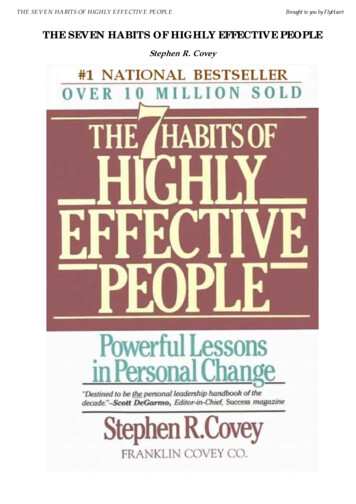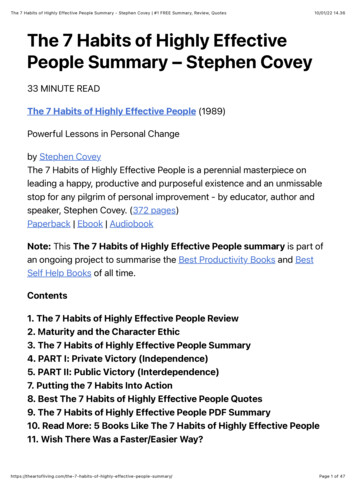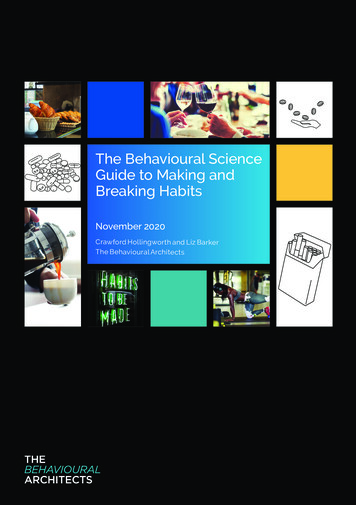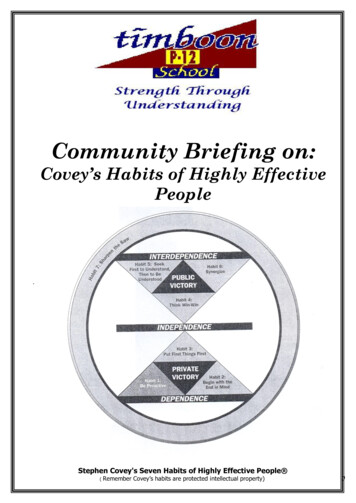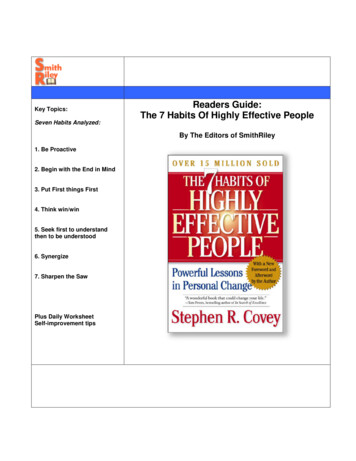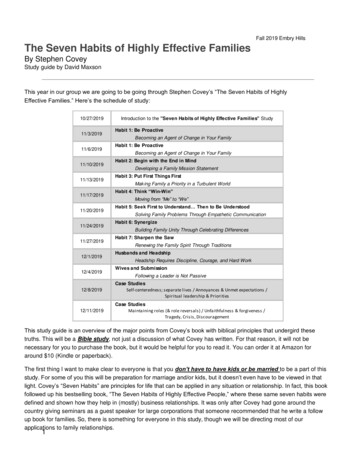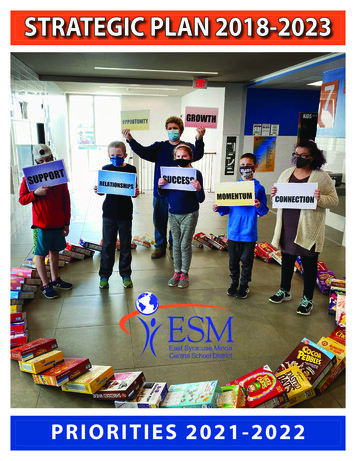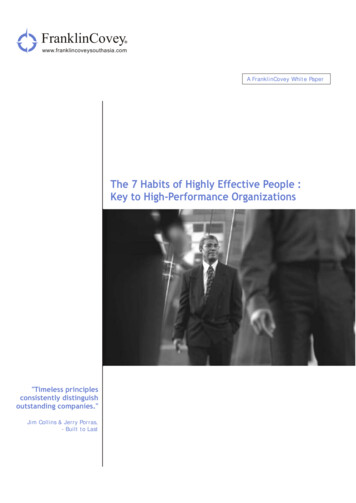
Transcription
FranklinCovey www.franklincoveysouthasia.comA FranklinCovey White PaperThe 7 Habits of Highly Effective People :Key to High-Performance Organizations"Timeless principlesconsistently distinguishoutstanding companies."Jim Collins & Jerry Porras,- Built to Last
“If leaders do not execute wellthey lose their economic base;if leaders do not operate basedon principles they lose theirvoice, their power.”—Stephen R. CoveyFranklinCovey (NYSE:FC) is a global leader in effectiveness training, productivity tools, and assessment services for organizations and individuals. FranklinCoveySouthAsia helps companies succeed by unleashing the power of their workforce to focus on and execute top business priorities. Clients include 90 percent of theFortune 100, more than 75 percent of the Fortune 500, thousands of small and mid-sized businesses, as well as numerous government entities and educationalinstitutions. Organizations and individuals access FranklinCovey SouthAsia products and services through corporate training, licensed client facilitators, one-ononecoaching, public workshops, catalogs, over 180 retail stores, and www.franklincoveysouthasia.com. More than 3,000 FranklinCovey associates provideprofessional services and products in 6 Continents and in 129 countries. 2004 FranklinCovey All rights reserved. 0402005 SKU#74404
FranklinCovey www.franklincoveysouthasia.comThe 7 Habits of Highly Effective People :Key to High-Performance OrganizationshWhat are the repeatable and proven principles that, when applied, result in highperformance organizations, teams, and people? What differentiates high performancefrom adequate or even failed performance? Most companies - even large, wellestablishedones - fail to survive more than a few years or decades.Organizations that thrive and grow are the ones that live by the basic principles of highperformance: high focus on mission and values along with superb execution. Strictlyspeaking, however, organizations don't have minds and souls of their own. In greatorganizations, it's the people who make the difference.No company can truly succeed until individuals within it succeed.That's what The 7 Habits of Highly Effective People workshop from FranklinCovey isabout - making people effective so that they, in turn, can make their organizations effective.People who live by the 7 Habits .11. Be Proactive Grasp opportunity with determination and take the initiative toleverage it; they don’t wait around for things to change anddon’t play “victim.” They have a strong sense ofempowerment.2. Begin with the End in Mind Are driven by a compelling mission, vision, and strategy, alongwith a strong set of core values and competencies. There’s apowerful bias for results.3. Put First Things First Stay highly focused on a crucial few mission-critical goals thatare ambitious, clearly articulated, and measured. Execution isking time is managed, not squandered.4. Think Win-WinAre trusted partners with suppliers and customers, valuing andcontinuously building key relationships of mutual benefit.5. Seek First to Understand,Then to Be Understood Listen hard to stakeholders - market, customers, employees and communicate with a customer focus and strong servicesorientation.6. Synergize Value diversity and creative collaboration, constantly seekingthe innovative solution, the “third alternative,” in alliances andpartnerships.7. Sharpen the Saw Continuously improve every key process and relationship.Strong premium placed on organizational learning. Peoplepractice life balance and constant self renewal.
FranklinCovey www.franklincoveysouthasia.comNothing less can ensure survival and prosperity in these tumultuous times.The whirlwind oftechnological advances; the changing tide of global, national, and local markets; the stormsof mergers, downsizing, and structural changes—these are justsome of the proliferatingchallenges that organizations face today.Quick-fix solutions do not work in this environment. Piecemeal improvements are futile.Only those organizations that have made the effort to build a solid foundation of highlyeffective people can endure.The principles taught in The 7 Habits of Highly Effective People—the No. 1 best seller byDr. Stephen R. Covey, co-founder and chairman of FranklinCovey Co.—are brought to lifein a powerful learning experience involving individual effectiveness measures, training, andtools. It has helped transform thousands of organizations throughout the world bytransforming the people they depend on.What’s the Impact of The 7 Habits?As individuals learn and apply The 7 Habits, they become dramatically more effective.Literally hundreds of thousands of people have learned The 7 Habits. More than 5 millionpeople have participated in The 7 Habits 360 Profile. Some 15 million copies of the bookhave been sold worldwide.In a study of 46 organizations that have implemented The 7 Habits, the return oninvestment(ROI) in The 7 Habits training coupled with 360 Profiles averagesaround 173 percent. ButROI isn’t the whole story.Another study of 15 organizations across 6 industries reveals a sampling of theperformance improvements organizations typically see in their people:1More focus on organizational priorities7680604020026Before 7HAfter 7H% of who agree “I prioritize my job tasks so that the more important aspects of my jobget the most time and attention.”21These results are drawn from The FranklinCovey Impact Analysis System developed by the Jack PhillipsCenter for Research.2
8710080604020037Before 7HStronger interpersonal relationshipsAfter 7HStronger interpersonal relationships8610080604020053Before 7H"I am an effective listener."After 7H8910080604020060Before 7HAfter 7H"I seek to understand the needs andconcerns of others."3
FranklinCovey www.franklincoveysouthasia.comImproved teamwork9110080604020065Before 7HAfter 7H"I am open to others’ ways of doing things."9210080604020058Before 7HAfter 7H"I often use the knowledge andskills of others to better accomplish tasks."These are just a few examples of the performance improvements organizations typically seewhen their people learn and apply The 7 Habits.Beyond the statistics, here is an example of a firm where people use The 7 Habits of dealsuccessfully with organizational challenges.The 7 Habits Improve Business ResultsA large, century-old health care firm in the western United States was wrestling with afragmented and unresponsive financial system. So new systems were implemented.Integration of process and technology went well. The plans were good; the tools wereexcellent. But somehow it wasn’t working . Things didn’t move. They realized that goodstrategies and systems weren’t enough - the people were not making it happen!As is so often the case with new initiatives, senior managers found it tough to agree onobjectives. There was little teamwork. Financial services didn’t connect with the divisiondealing with health information services and vice versa. Communication problems andconflicts slowed down the invoicing process.4
Long after patients were released, their accounts were unsettled.The bottom line: the peoplehad a new direction and new technology, but they weren’t executing.They had adopted great new processes and great technology, but the people had to change,too. So they called on FranklinCovey to partner with them. FranklinCovey then applied thepower of The 7 Habits.After clarifying the specific outcomes both partners wanted to see, FranklinCoveyconsultants determined quickly where the performance gaps were: fragmented teams,communication problems, misaligned goals—all symptoms of a culture that lacked focus,unity, trust, and the discipline to execute.Beginning with five senior executives and 16 managers from the finance group, a uniqueblended learning experience focused on the disciplines needed to overcome the barriers toexecution. Two brief sessions on personal discipline (Habits 1-3, 7: developing proactivity,vision, and focus) were followed by a month of guided application. During this time the teamparticipated in exercises and reviewed theirprogress.Participants also learned to use FranklinCovey tools to help people focus on trueorganizational priorities—to eliminate the unimportant and to optimize their efforts. Thesetools included the renowned FranklinCovey Planner as well as Win- Win Agreements thathelp people follow through on commitments.Two more focused sessions on interpersonal disciplines (Habits 4-6: win-win thinking,understanding, and synergy) were followed up in the same way. After a month’s application,the group came together one more time for a work session on how to continuously improvetheir capacity to execute.The team was determined to make a change. Everyone attended every session, everyone wasinvolved in the application phases, and everyone applied the tools.The results? The FranklinCovey intervention—a unique combination of measures, The 7Habits learning, and tools—helped bring about a breakthrough. Processing costs droppedby nearly two thirds as divisions learned to communicate. Managers are now rated muchmore highly by their reports. The CFO remarks that the finance managers “just workdifferently. There’s more teaming, less of a silo feeling. We are absolutely delighted.”5
FranklinCovey www.franklincoveysouthasia.comWe’ll Help You See, Think, and Act Differently—to Get Better ResultsIn today’s business environment, it’s not enough to do things differently. You must dodifferent things. The 7 Habits workshop will help you and the people in your organizationchange the fundamental way they approach their jobs, relationships, even problems andopportunities by:lllBreaking common ineffective behaviors and tendenciesCreating high levels of trustDeveloping strong interdependent relationshipsOnce you see and think differently, you will act differently. And those actions will producesuperior results. This sort of transformation is the key to turning organizations into placeswhere effective people create lasting results.Here’s a brief overview of the business issues people are faced with today, and how theprinciples taught inHABIT 1: BE PROACTIVEIssue:We live in an era of strategic turmoil—of new business models, strategic combinations,globalization, and revolutions in technology. The rapid pace of change can causeorganizations to turn reactive and defensive, to suffocate from uncertainty. Fear and anxietyset in. However, an organization can respond to change proactively and positively, seeking andseizing opportunity. Faltering organizations can turn around if they take a proactive stance.The issue is building an organization that focuses on opportunities for creating valuerather than on the obstacles to it.Principles:“Proactive people and organizations are solutions to real problems. They seize the initiative tocreate value for their stakeholders and take responsibility for results.” (S.R. Covey) “Every wallis a door.” (R.W. Emerson)14156Ibid., Aggregate Results, Jack Phillips Center.Jack Phillips Center ROI study of 46 organizations across 12 industries. Feb 2002
Benefitsl Greater focus on innovative ways to build valuel Employees who take ownership for solving problems and adding valuel Faster, more creative problem solving and decision makingHABIT 2 : BEGIN WITH THE END IN MINDIssue :We are in a time of strategic retrenchment when organizations are stripping away everythingthat isn’t core and trying to find or renew their direction and focus. Effective organizationsare marked by a strong central focus, a powerful core ideology, and a compelling mission andstrategy.Principles :“Successful enterprises first clearly define what they are trying to accomplish. The extent towhich you begin with the end in mind often determines whether or not you are able to createa successful enterprise.” (S.R. Covey) “ The very essence of leadership is vision. You can’tblow an uncertain trumpet.” (Theodore Hesburgh)Benefits :l Core values and ideology enable more focused branding, better compatibility in hiringand partneringl Shared mission provides better sense of strategic directionl Efficient, repeatable process for identifying strategic objectives.HABIT 3 : FIRST THINGS FIRSTIssue :In this economy, success means execution - getting it done. However, many organizationsflag in their execution of key objectives. Three-fourths of CEO failures are due to failure toexecute. Somehow, they can’t get their organizations focused on the things that matter most.Knowledge workers report being very busy, but spending less than half their time on keyobjectives. The issue is shared commitment to strategic objectives (alignment) andeffective execution at all levels.7
FranklinCovey www.franklincoveysouthasia.comPrinciples:“Things that matter most should never be at the mercy of things that matter least.” “It ispossible to be busy, very busy, without being effective.” (S.R. Covey)“Management by objectives works—if you know the objectives. Ninety percent of the timeyou don’t.” (Peter Drucker)Benefits:l Tighter organizational alignment to strategyl Greatly improved cost-effectiveness of human resourcel Faster, more precise execution of key objectivesHABIT 4: THINK WIN-WIN:IssueRight now the boundaries are getting fuzzier. New ideas are changing the relationships alongthe value chain between management and employees, clients and suppliers, partners andallies. Truly effective organizations develop strong networks up and down the value chain.They are trusted partners because they manage their relationships according to a widelyknown but little understood principle: Win-Win. The issue is creating shared commitmentto organizational imperatives.Principles:“In an interdependent reality, better results come from cooperating than from competing.”(S.R. Covey)Benefits:l Increased organizational buy-in to key objectivesl More focus and alignment to real client needs without giving away the storel More productive relationships along the value chainl Fewer conflicts and confrontationsl Increased incentive and empowerment of team members to executeHABIT 5: SEEK FIRST TO UNDERSTAND, THEN TO BE UNDERSTOODIssue:A key habit of highly effective organizations is sharp focus on client needs—whether the clientis internal or external. But authentic focus on client needs is rare. Every interface with the clientshould add value to the relationship; that can only happen when the culture of the organization,work groups, and individuals develops the discipline of empathic communication.Principles:“Diagnosis must precede prescription.” (S.R. Covey)8
Benefits:l More precise fulfillment of customer needs, better deals, more revenuel Improved, more enduring relationships along the value chainl Better organizational alignment through clearer communicationHABIT 6: SYNERGIZEIssue:Strategic combinations are becoming more important. Bigger and bigger bets are beingmade to achieve scale and global presence. However, such combinations often have troublegetting focused. Most mergers fail: 83% fail to create value, over half destroy shareholdervalue. Merger and Acquisition success is often hindered by territoriality, culture gaps, andincompatible systems. On a smaller scale, alliances, supply-chain partnerships, evencustomer relationships are a form of ‘‘strategic combination’’ to create value. Often, they failto do so. The issue is integration to create value.Principles:“Synergy is everywhere in nature.” (S.R. Covey) “Strategic innovation—the greatest sourceof value creation—is the result of a coming together of disparate viewpoints or elements.”(R. Hamel)Benefits:l Faster and more successful Merger and Acquisition integrationl More value-added relationships along the supply chainl More value creation from strategic innovationl Increased leverage from diversityHabit 7 : SHARPEN THE SAWIssue :lEveryone believes in the principle of continuous improvement. Nevertheless, because ofthe dysfunctional habits of many organizations - and their people getting better at what theydo is often pushed to the back of the priority list. As a result, ineffective organizationseventually die as their competitors overtake them in product and service quality and marketshare. Highly effective organizations live by the principle of continuous improvement.Principles :“Even if you’re on the right track, you’ll eventually get run over if you stand still.”(Anonymous)Benefits :Greater focus on increasing productive capacityEver -increasing quality in products and servicesEver-improving relationships with internal/external clientsFranklinCovey www.franklincoveysouthasia.comM1/12, DLF Phase II, Gurgaon - 122002Tel. : 0124 - 4782222 Telefax : 91-124-4301464E-mail : connect@franklincoveysouthasia.com, Web : www.franklincoveysouthasia.com9
FranklinCovey www.franklincoveysouthasia.comFRANKLINCOVEY helps organisations succeedby unleashing the power of their workforce toFOCUS AND EXECUTE on their HIGHEST PRIORITIESFranklinCovey's solutions include:THE 7 HABITS OF HIGHLY EFFECTIVE PEOPLE THE 7 HABITS FOR MANAGERSTMTMTHE 7 HABITS FOR ASSOCIATETMTHE 7 HABITS MAXIMISERLEADERSHIP- GREAT LEADERS, GREAT TEAMS, GREAT RESULTSHELPING CLIENTS SUCCEEDTHE 4 ROLES OF LEADERSHIP FOCUS: ACHIEVING YOUR HIGHEST PRIORITIES4 DISCIPLINES OF EXECUTION - Manager Certification4 DISCIPLINES OF EXECUTION - For TeamsPROJECT MANAGEMENT TECHNICAL WRITING ADVANTAGE WRITING ADVANTAGEPRESENTATION ADVANTAGE Our Offices :Gurgaon (Corporate Office) :M1/12, DLF City, Phase IIGurgaon 122002 IndiaTel : 0124 - 4782222Mumbai :101/102, 1st Floor, A N Chambers,Turner Road, Bandra (W),Mumbai - 400 050.Tel.: 022 - 26431702-04Bangalore :No. 55, 30th Main, IInd Stage,1st Phase, 4th Cross,BTM Layout, Bangalore - 560 076Tel. : 080 - 41678888, 40716888Hyderabad :A-2, 2nd Floor, Plot 18,10-2-197,Surya Mansion,West Marredpally,Secunderabad - 500 003Tel. : 040 - 66903011-15Mumbai :1st Floor, N.M. Wadia Building,123, Mahatma Gandhi Road,Fort, Mumbai 400023Tel. : 022- 22674261, 22675941Kolkata :7 / 2B, Dover Lane,Kolkata - 700 029.Tel. : 033 - 40011825-26Chennai :1 B, Abhirami Foilage, 15 Dr. T.V. NaiduStreet, Srinivasa Nagar, Off. SpurtankRoad, Chetpet, Chennai - 31Tel : 044-42849680- 83Pune :B-13, 4th Floor, Sukhwani Park,North Main Road Koregaon Park,Pune - 411001Tel. : 020 - klincoveysouthasia.com
Literally hundreds of thousands of people ha ve lear ned T he 7 Habits . More than 5 million people ha ve participated in T he 7 Habits 360 Profile . Some 15 million copies of the book ha ve been sold w orldwide . In a study of 46 org anizations that hav e implemented T he 7 Habits , the retur n onin vestment (ROI) in T he 7 Habits training .


